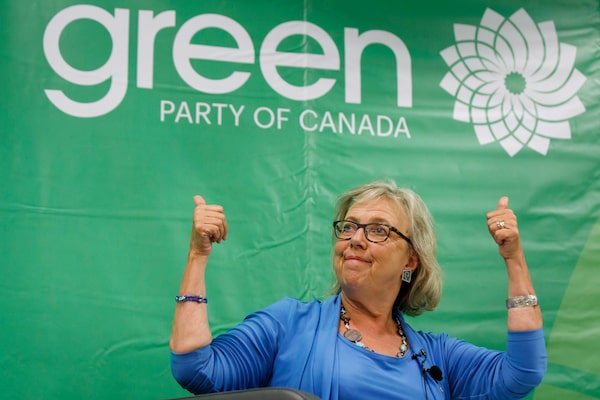The federal Green Party says it will provide job transition programs for workers in the oil, gas and coal sectors as part of their plan to reduce Canada’s greenhouse gas emissions by 60 cent from 2005 levels by the year 2030.
The Greens, in their election platform that will be launched on Monday, would ban hydraulic fracking in the natural gas industry, cancel the Trans Mountain pipeline expansion, and eliminate what they describe as fossil fuel subsidies. The cost of the platform will not be released for another week, however, leaving questions about the economic impact of the Greens’ proposals hanging over the plan.
The party’s platform is designed to address a climate crisis, and says new jobs would be created through investments – by both government and the private sector – in a massive energy efficiency retrofit of residential, commercial and institutional buildings, as well as green transportation infrastructure, including a high-speed rail in the Toronto-Ottawa-Quebec City triangle and the Calgary-Edmonton corridor.
Under the Greens, there would be no new pipelines, or coal, oil or gas drilling or mining in Canada.
“Inevitably, jobs in fossil fuel sectors will disappear. The Green Party is committed to a 'just transition’ of workers from these sectors into new ones," the platform states. "This will include measures such as income protection, jobs guarantees, retraining and resettlement,” the platform states. Details would be developed in partnership with workers and their unions.
Green Party Leader Elizabeth May, in an interview Sunday, said the platform adds up to a strong Canadian economy: “This is what the economy needs,” she said. “It’s not a handful of work camps, but good-paying jobs, and lots of them.”

Green Party of Canada leader Elizabeth May speaks in Toronto during a fireside chat about the climate, Sept. 3, 2019.Cole Burston/The Canadian Press
Trevor Tombe, an associate professor in the University of Calgary’s department of economics, said building retrofits and construction of a nationwide electricity grid would have benefits, “but any action to lower emissions will come with a cost to the economy,” he said. “Maybe that’s a cost worth paying – and that’s a debate we should be having. But we shouldn’t be under the impression that we can dramatically change our behaviour without a cost.”
Decarbonizing the Canadian economy would be felt most in the provinces with the highest greenhouse gas emissions – Alberta and Saskatchewan, he added. Ms. May will be going to Calgary later in the week to explain her proposals.
Ms. May has been, for the most part, the sole Green representative in the House of Commons for eight years. (A recent by-election on Vancouver Island gave the Greens a second seat.) But this election campaign could offer the party’s best electoral opportunities, with rising concern about climate change among Canadians, and a growing number of Greens elected at the provincial level in the Maritimes, Ontario and British Columbia.
The Greens are pinning their hopes that this will be a breakthrough election, but they will also face increased scrutiny on policy, and have had to launch a process to vet candidates again after facing questions about abortion, separatism and criticism of Israel by Greens on the ballot.
Although the platform is centred on climate action, it also says a Green government would provide a guaranteed livable income, affordable housing for everyone, universal and comprehensive health care that includes prescription drug and dental care, and free postsecondary tuition.
Ms. May says the party sent its platform proposals to the Parliamentary Budget Office in June to obtain an independent assessment of the party’s fiscal estimates, but she said those figures are still not ready.
“We had a tough call to make, we could sit on our platform and wait. … So we made the judgment call that having the numbers out in a week, wasn’t too big of a risk,” she said. “The revenue pieces have been costed enough that I have confidence in our ability to pay for what we are promising.”
The Greens would double Canada’s target for cutting greenhouse gas emissions, compared to the Liberals, and a recent Environment Canada assessment suggests the Liberal government will not meet its target to cut the emissions to 30 per cent below 2005 levels by 2030.
The Greens propose taking “several billion dollars a year” that it would save by cancelling the Trans Mountain pipeline project, as well as stripping supports for fossil fuel industries, to spend on a Canadian Grid Strategy that would shift Canadians to renewable energy.
The Green platform is unusual in that it does not make proposals for the four-year electoral cycle, but an 11-year plan that would take Canada to 2030, citing the climate science warnings that global emissions must be cut by then.
“The climate emergency must be the lens through which every policy envelope is viewed," the platform states. “Alone among political parties, the Green Party has a climate emergency response plan that recognizes our house is on fire.”
One key short-term proposal would be to ensure that this federal election is the last in Canada under the present “first past the post” electoral system. The Greens would launch a Citizens Assembly on Electoral Reform with the mandate to make recommendations to Parliament on an electoral system that would “make every vote count.” Legislative changes to implement the recommendations of the Citizens Assembly would be made in time for the 2023 federal election.
 Justine Hunter
Justine Hunter